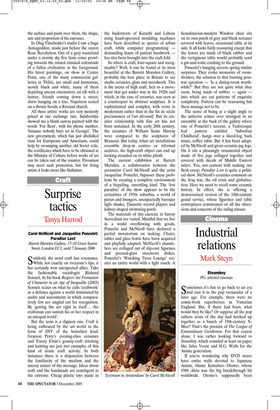Surprise tactics
Tanya Harrod
Carol McNicoll and Jacqueline Poncelet: Paradise Lost Barrett Marsden Gallery, 17–18 Great Sutton Street, London EC1, until 7 January 2006 Suddenly the word craft has resonance. While not exactly on everyone’s lips, it has certainly won unexpected allies. Take the fashionable sociologist Richard Sennett. In his book Respect: the Formation of Character in an Age of Inequality (2003) Sennett seizes on what he calls ‘craftwork’ as a defence against a world dominated by audits and assessments in which comparatively few are singled out for recognition. By ‘getting the act right in itself ... the craftsman can sustain his or her respect in an unequal world’.
But the term is a slippery one. Craft is being embraced by the art world in the form of DIY of the homeliest kind. Grayson Perry’s evening-class ceramics and Tracey Emin’s granny-craft stitching and knitting are just two examples of this kind of ironic craft activity. In both instances there is a disjunction between the familiarity of the medium and the uncosy nature of the message. Ideas about craft and the handmade are contingent in the extreme. Cheap plastic toys made in the backstreets of Karachi and Lahore using hand-operated moulding machines have been described as species of urban craft, while computer programming demanding hours of patient handwork has also been brought into the craft fold.
So where is craft, four-square and recognisable? Well, it can be found at its most beautiful at the Barrett Marsden Gallery, probably the best place in Britain to see studio ceramics, glass and metalwork. This is the arena of high craft, heir to a movement that got under way in the 1920s and which, in the case of ceramics, was seen as a counterpart to abstract sculpture. It is sophisticated and complex, with roots in modernism rather than in the fin de siècle preciousness of l’art décoratif. But its creative relationship with fine art has not been sustained. In the early 20th century, the ceramics of William Staite Murray were compared to the sculptures of Brancusi. But today, when art installations resemble drop-in centres or informal archives, the high-craft object can end up looking stranded on its white plinth.
The current exhibition at Barrett Marsden, a collaboration between the ceramicist Carol McNicoll and the artist Jacqueline Poncelet, bypasses these problems by creating a complete environment of a beguiling, unsettling kind. The ‘lost paradise’ of the show appears to be the certainties of 1950s suburbia, a world of patios and loungers, unexpectedly baroque light shades, Dansette record players and kidney-shaped swimming-pools.
The materials of this exercise in Surrey Surrealism are varied. Mindful that we live in a world overflowing with goods, Poncelet and McNicoll have declared a partial moratorium on making. Chairs, tables and glass bowls have been acquired and playfully adapted. McNicoll’s chandeliers are collaged out of slip-cast figurines and pressed-glass sweetcorn dishes. Poncelet’s ‘Watching Trees Lounge’ creates an entire world with a light touch. A Scandinavian-modern Windsor chair sits on its own patch of grey and black terrazzo covered with leaves, occasional table at its side. It all looks fairly reassuring except that the leaves are made of black rubber and the vertiginous table would probably send a gin-and-tonic crashing to the ground.
Poncelet’s hanging screens spring similar surprises. They evoke memories of roomdividers, the solution to that burning postwar question — ‘Is a dining-room worthwhile?’ But they are not quite what they seem, being made of rubber — again into which are cut patterns of exquisite complexity. Pattern can be reassuring but these manage not to be.
The sense of being at a slight angle to the universe comes over strongest in an ensemble at the back of the gallery where one of Poncelet’s screens, a Tudoresque leaf pattern entitled ‘Suburban Childhood’, hangs over a sliced-log, bark intact, coffee table. But it has been adapted by McNicoll and given ceramic-jug legs. On it sits a pleasingly ornamental object made of five jugs collaged together and covered with decals of Middle Eastern rulers. Yes, not content with making our flesh creep, Paradise Lost is quite a political show. McNicoll’s ceramics comment on the Iraq war, the oil crisis and globalisation. Here we need to recall some ceramic history. In effect, she is offering a democratised version of the 18th-century grand service, whose figurines and table centrepieces commented on all the obsessions and concerns of the ruling classes.



























































 Previous page
Previous page